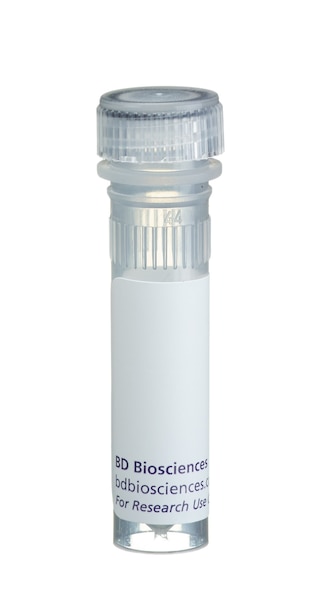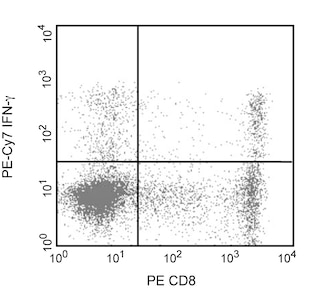Old Browser
This page has been recently translated and is available in French now.
Looks like you're visiting us from {countryName}.
Would you like to stay on the current country site or be switched to your country?


.png)

Ig isotype control for the expression of IFN-γ by stimulated human peripheral blood mononuclear cells (PBMC). Human PBMC were stimulated for 4 hours with PMA (5 ng/ml, Sigma) and Ionomycin (500 ng, Sigma) in the presence of Brefeldin A (GolgiPlug, Cat. No. 555029). Cells were harvested, fixed, permeabilized and stained with PE Mouse Anti-Human CD8 (Cat. No. 555367) and either PE-Cy™7 Mouse Anti-Human IFN-γ (Cat. No. 557643; left panel) or PE-Cy™7 Mouse IgG1 κ Isotype Control (Cat. No. 557646/565573/557872; right panel) as a specificity control by using Pharmingen's staining protocol. To demonstrate additional specificity of staining the binding of PE-Cy™7 Mouse Anti-Human IFN-γ was blocked by preincubation of the fixed/permeabilized cells with an excess of unlabeled Purified Mouse Anti-Human IFN-γ (5 µg, Cat. No. 554699; data not shown) prior to staining. The quadrant markers for the bivariate dot plots were set based on the autofluorescence and isotype control.
.png)

BD Pharmingen™ PE-Cy™7 Mouse IgG1 κ Isotype Control
.png)
Regulatory Status Legend
Any use of products other than the permitted use without the express written authorization of Becton, Dickinson and Company is strictly prohibited.
Preparation And Storage
Recommended Assay Procedures
Immunofluorescent Staining and Flow Cytometric Analysis: The PE-Cy™7 Mouse IgG1 κ Isotype Control (Cat. No. 557646/565573/557872) is a suitable mouse IgG1κ isotype control for assessing the level of background staining on paraformaldehyde fixed/saponin-permeabilized (such as BD Cytofix/Cytoperm™) mouse or human cells for flow cytometric analysis. For specific methodology, visit the protocols at our website, http://www.bdbiosciences.com/us/s/resources.
Product Notices
- This reagent has been pre-diluted for use at the recommended Volume per Test. We typically use 1 × 10^6 cells in a 100-µl experimental sample (a test).
- An isotype control should be used at the same concentration as the antibody of interest.
- Source of all serum proteins is from USDA inspected abattoirs located in the United States.
- Caution: Sodium azide yields highly toxic hydrazoic acid under acidic conditions. Dilute azide compounds in running water before discarding to avoid accumulation of potentially explosive deposits in plumbing.
- This antibody has been optimized and preassayed with its matched isotype control to be used at the recommended volume of 5 ul/test. Titration of the reagents or substituting with other (non-matched) isotype control is NOT recommended.
- Warning: Some APC-Cy7 and PE-Cy7 conjugates show changes in their emission spectrum with prolonged exposure to formaldehyde. If you are unable to analyze fixed samples within four hours, we recommend that you use BD™ Stabilizing Fixative (Cat. No. 338036).
- PE-Cy7 is a tandem fluorochrome composed of R-phycoerythrin (PE), which is excited by 488-nm light and serves as an energy donor, coupled to the cyanine dye Cy7, which acts as an energy acceptor and fluoresces maximally at 780 nm. PE-Cy7 tandem fluorochrome emission is collected in a detector for fluorescence wavelengths of 750 nm and higher. Although every effort is made to minimize the lot-to-lot variation in the efficiency of the fluorochrome energy transfer, differences in the residual emission from PE may be observed. Therefore, we recommend that individual compensation controls be performed for every PE-Cy7 conjugate. PE-Cy7 is optimized for use with a single argon ion laser emitting 488-nm light, and there is no significant overlap between PE-Cy7 and FITC emission spectra. When using dual-laser cytometers, which may directly excite both PE and Cy7, we recommend the use of cross-beam compensation during data acquisition or software compensation during data analysis.
- For fluorochrome spectra and suitable instrument settings, please refer to our Multicolor Flow Cytometry web page at www.bdbiosciences.com/colors.
- Please observe the following precautions: Absorption of visible light can significantly alter the energy transfer occurring in any tandem fluorochrome conjugate; therefore, we recommend that special precautions be taken (such as wrapping vials, tubes, or racks in aluminum foil) to prevent exposure of conjugated reagents, including cells stained with those reagents, to room illumination.
- Cy is a trademark of GE Healthcare.
- Please refer to www.bdbiosciences.com/us/s/resources for technical protocols.
Companion Products


.png?imwidth=320)



The MOPC-21 immunoglobulin is a mouse myeloma protein. The MOPC-21 immunoglobulin was selected as an isotype control following screening for low background on a variety of mouse and human tissues.

Development References (1)
-
Prussin C, Metcalfe DD. Detection of intracytoplasmic cytokine using flow cytometry and directly conjugated anti-cytokine antibodies. J Immunol Methods. 1995; 188(1):117-128. (Methodology: Flow cytometry). View Reference
Please refer to Support Documents for Quality Certificates
Global - Refer to manufacturer's instructions for use and related User Manuals and Technical data sheets before using this products as described
Comparisons, where applicable, are made against older BD Technology, manual methods or are general performance claims. Comparisons are not made against non-BD technologies, unless otherwise noted.
For Research Use Only. Not for use in diagnostic or therapeutic procedures.
Report a Site Issue
This form is intended to help us improve our website experience. For other support, please visit our Contact Us page.